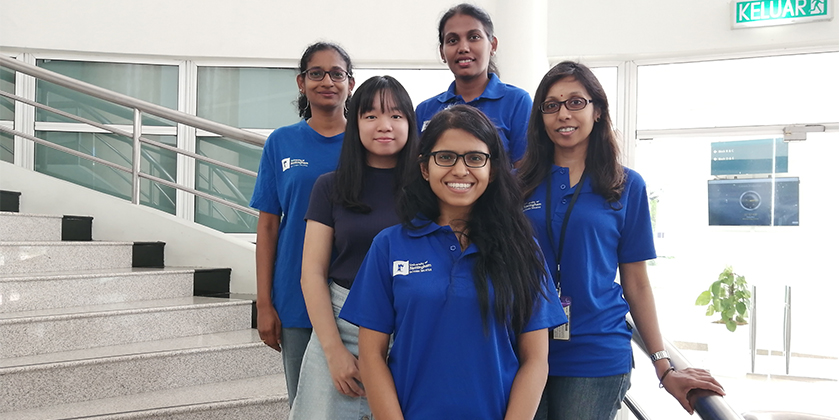
May 7, 2019, by Communications
Assistant professor bags Teaching and Learning Fund
Assistant Professor Sharon Romeo from the Foundation in Science Department was awarded the University of Nottingham’s Teaching and Learning Fund.
The win entitled Romeo to an all-expense-paid trip to the UK for a Teaching and Learning Conference, which took place on 3 May 2019 in the University Park Campus. Romeo and her colleagues – Dr Thamil Vaani, Dr Sheila Ilangovan and Salomy Sumithra Krishnan – showcased a research project entitled Peer Assisted Learning Programme (PAL): A student-centric engagement tools for Foundation students on the Peer Assisted Learning programme that they had used to assist Foundation students who had to undertake re-assessments in the Mathematics module.

The PAL team: (clockwise) Dr Thamil Vaani, Dr Sheila Ilangovan, Sharon Romeo, Sin Kai Ling and Salomy Krishnan.
Over the years, Romeo and her colleagues had noted a trend among students in the Foundation of Science programme, where the failure rate stood at between 5 and 15% for every Mathematics module offered in each semester.
So, they set out to design The Peer Assisted Learning (PAL) programme, a pilot programme that provided learning support to the students before their re-assessment examination. Students who had to re-sit for their re-assessment examinations were encouraged to participate in the PAL programme. The students who signed up for the programme were then assigned to mentors – student volunteers, who had scored distinctions in their maths modules. A minimum of 20 hours was required by each mentor-mentee pair.
“Prior to the implementation of the PAL programme, a briefing was carried out and a survey was conducted to gauge the students’ commitment towards the programme. The results showed that 67% of the students were either likely or very likely to be part of the programme. Meanwhile, 94% believed that peer mentoring could improve their knowledge,” Romeo shared.
Both mentors and mentees found that they gained plenty of personal benefits from the PAL programme. Mentors said that they found satisfaction in observing their mentees progress in their understanding of the topic while developing their own teaching and communication skills. Mentees meanwhile gained effective learning skills and appreciated the level of commitment displayed by their mentors. They also found that the PAL programme had a direct positive impact on their performance in their re-assessment as their grades had significantly improved.
“I have been working with A Levels students for a few years and have seen the positive impact of peer-assisted learning. It is not surprising that students benefit from learning from each other. I am eager to see the fruits of that in this new venture,” Romeo said.
-
Post a comment
